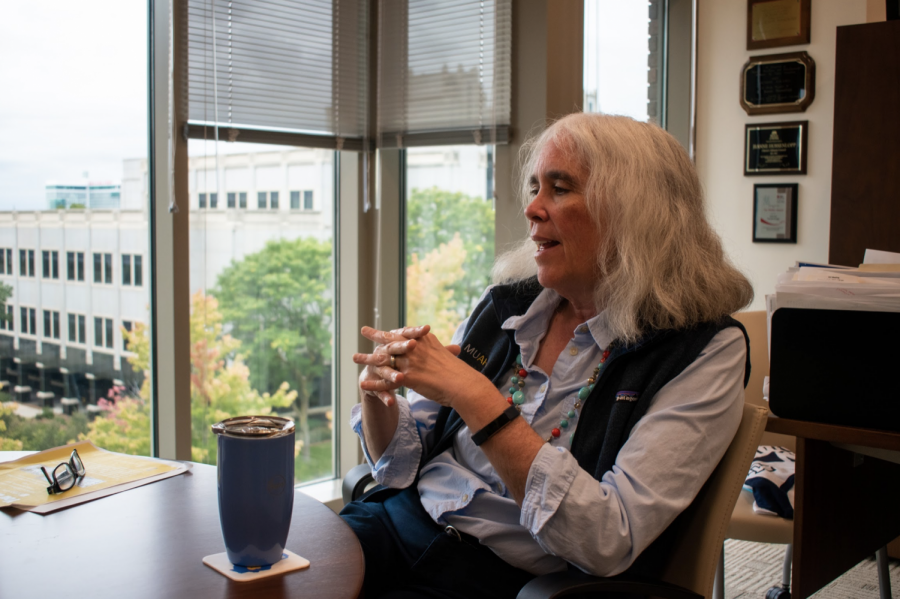 When it comes to an academic experience, it is incredibly refreshing to be in a class comprised of students from varying fields of study.
When it comes to an academic experience, it is incredibly refreshing to be in a class comprised of students from varying fields of study.
It’s far too easy to fall into a monotonous routine when enrolling in and attending class. We see and sit by the same people, become well-versed in the thoughts and opinions of those around us and can often predict what our fellow classmates will say.
Most classes that fall within the core of common studies, however, push us out of our comfort zones and provide new faces and professors. These courses introduce not only new perspectives but new methods of thought. The opinions derived from such a variety of students are more diverse, and the discussion is often more entertaining and productive.
It’s disappointing, though, when people aren’t open-minded to such an array of thoughts and opinions.
I’m currently in a class geared toward students of a specific area of study but filled with individuals representing many majors, colleges and ages. Although this class is labeled in CheckMarq as representing a specific major, the content and messages within it are truly beneficial to all.
As I left this class earlier in the week, two students were talking loudly about how much they disliked the course. This sentiment surprised me, for I thought the discussion that day was particularly productive, with many opposing ideas shared.
To complement the students’ negative outlook, one of them proceeded to say, “We’re the only real people in that class.”
Whoa. You’re the only “real” people in that class? What exactly does that mean? I’m pretty sure that I’m a real person, but then again maybe not. Perhaps I’m just a figment of someone else’s imagination. I really hope not … that would be quite a bummer.
The worst part, though, is that this isn’t the first time I’ve heard this type of comment made. It’s common to judge and belittle people in majors and colleges other than our own. Not only is it common, but at times it seems as if it’s expected.
For example, apparently it’s not the College of Arts & Sciences, it’s the College of Arts and Crafts. Business students graduate only to lead mundane lives in cubicles. Education majors are overly sensitive, patient and kind. Engineering students are socially awkward. Students in the College of Health Sciences spend all their time talking about the MCAT and trying to discreetly figure out each other’s GPAs. Nurses are cliquey. And College of Communication students … well, they’re not even worth mentioning.
Whether or not you perpetuate or agree with your own college’s stereotypes, these are the frameworks in which we see and talk about each other every day. We judge each other’s intelligence, character, work ethic and aptitude based on a label within a drop-down menu many of us selected upon applying to college.
To an extent, some of it is true. Engineers may not be awkward, but they dedicate a lot of time and work to achieve the same quality of grades others can reach by putting in minimal effort – not because those other students are more intelligent, but because it’s simply a different type of curriculum, workload and method of thought.
At times, education students do have to be unbelievably kind and patient. Is that a bad thing, though? They will, after all, be teaching all our kids some day.
And yeah, Health Sciences students tend to talk about grades, but it’s only because grades really affect their career aspirations. Having a high GPA is important for everyone, but when medical school is on the line, it gets just a tad more stressful.
Some people choose to chase their passions without regard for money and guaranteed stability, whereas others aim to eventually support a family. Our majors are indicative of our interests and goals, and one’s aspirations are not something to be judged by anyone but that person.
So what is “real?” And who has the right to define what is “normal?”
The definition most certainly does not exist in a few words on a college transcript or diploma, nor can we label it based on our own interests, knowledge and career paths. At a very young age we’re taught to “be ourselves,” and that uniqueness is positive. If we were all the same, there would be no innovation or progress. There wouldn’t be any variance in art, technology or advancement in medicine.
Society maintains its balance because we are all different and can bring distinct things to the table. If this wasn’t the case life would be boring, and we’d live in a very single-track world.
We should seek to understand other perspectives and ways of thought – it might help us define our own. Generalizations and stereotypes don’t get us anywhere, and disagreeing with someone solely because they’re different is ignorant. It’s more productive to get to know someone who is different rather than look down upon them as an attempt to make sense of something we don’t understand.
After all, something that may not be normal to you may be entirely “real” to someone else.
—
Brooke Goodman is a senior studying journalism and political science. Email her at brooke.goodman@marquette.edu with anything you’d like to see her write about.






